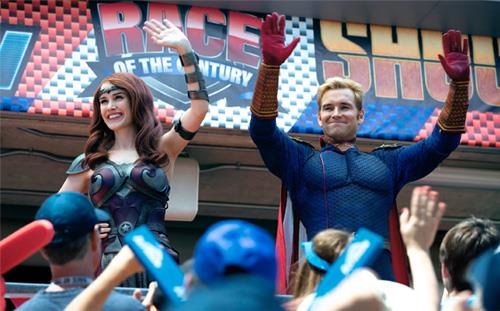
Much of the comic superhero world, notably Marvel, has long insulated itself against satire by systematically poking fun at its own characters. A lot of those guys, and women, treat saving the world as a welcome respite from dealing with their private neuroses.
Nonetheless, we need The Boys, the long-incubating TV series adaptation of the Garth Ennis/Darick Robertson comic book that asks the question, “What if superheroes were secretly corrupt, money-hungry and self-serving?”
The small screen version of The Boys becomes available Friday on Amazon Prime, and even if you care nothing about the multibillion-dollar superhero movie, TV, comic, and marketing industry, it spins a good yarn.
In that sense, it’s not unlike Marvel, DC, and superhero tales everywhere. If you can tell a story that makes viewers keep wondering what will happen next, you’ll probably succeed. The Boys does that.
Hughie Campbell (Jack Quaid) leads a timid, inoffensive life, working as a tech geek/sales clerk at an electronics store. Then one day, while his girlfriend Robin is gently prodding him to ask for a raise or move in with her or for God’s sake just do something, Robin is run down by a speeding superhero named A-Train (Jessie Usher), who was on his way from somewhere to somewhere and wasn’t paying attention.
Tough break, Hughie. But as his father (Simon Pegg) points out, Hughie’s too indecisive to do anything about it so life will stumble on.
Except Hughie runs into Billy Butcher (Karl Urban), a vaguely menacing character who has much of the style of a Marvel superhero without the superpowers.
Billy is demanding and annoying. He also has a cause and an inclination to act on it.
Superheroes, Billy tells Hughie, don’t really dedicate their lives to selflessly saving the world. They dedicate themselves to self-glorification and making money. They’re the strutting Big Man On Campus, the high school football team captain and prom king who thinks he’s better than everyone else and therefore doesn’t have to follow everyone else’s rules. Being saviors is simply a gig that enshrines their entitlement, and while it’s not totally a scam, it’s also not their primary motive.
The alpha superheroes in The Boys belong to an elite force called The Seven, and when they aren’t posing for smiling selfies with naïve young fans, they’re huddling with their agent Madelyn Stillwell (Elisabeth Shue). Madelyn cuts nine-figure deals with big cities for things like exclusive rights to a superhero and cares far more about the points in a merchandising operation than about, say, Robin.
The Seven could be any random superhero posse out of any comic book, TV show or movie. Its leader is Homelander (Antony Starr), and as we join the story, The Seven is about to replace a retiring member with a newbie, the aptly named Starlight (Erin Moriarty), whose superpower seems to be that she glows.
Starlight hails from the heartland, and her mother first wanted her to be a beauty pageant queen until Starlight realized she preferred to save the universe.
Mom reluctantly went along, and now the dream has come true, except that when Starlight walks wide-eyed into her first orientation session, she discovers that Homelander is less a mentor than a swaggering, sneering misogynistic pig.
That knocks some of the glow out of Starlight, and it doesn’t help when fellow Seven member Queen Maeve (Dominique McElligott) casually tells her that’s how things roll in the superhero world, kid, so you might as well get used to it.
That gives Starlight a certain cosmic empathy with Hughie and Billy, though they remain in different worlds. The only connection between Hughie and Starlight comes through a brief chance encounter in which they both confess their stories without knowing who the other is.
Still, Hughie finally becomes sufficiently outraged by the indifference of The Seven and their organization to Robin’s death that he joins The Boys, a group Billy has set up to counter and perhaps ultimately expose The Seven and their cynical marketing machine.
That’s a tough gig, first because the world loves The Seven and second because none of The Boys has superpowers.
Ironically, though, The Boys much more than The Seven embody the spirit of superheroes past. They’re determined and resourceful. They also seem to generally operate on the side of right, though The Boys will never be confused with choir boys.
At times their motto seems to be “by any means necessary,” which correctly suggests that things can get rough out there. Things also get fairly graphic, in violence, sex, and language.
Then on top of this basic throwdown, Madelyn and her corporation also are sitting on at least one major secret that, if revealed, could undermine their whole operation.
The Boys walks a line, not always thin, between comic satire and a much darker story about what happens when we want to trust leaders and public figures so much that we become blind to the possibility they might not be what they seem.
That’s a cosmic dilemma worthy of a whole comic book series, which is how The Boys began 13 years ago. It’s taken almost that long to shape-shift it into a TV series, and while that kind of long incubation often does not bode well, here, it plays out heroically.